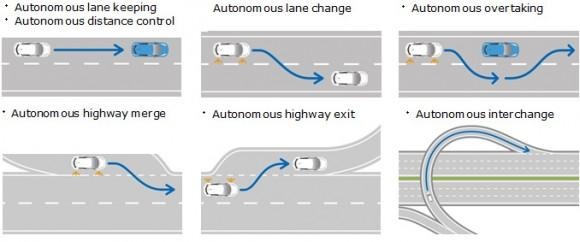Nissan Self-Driving Car Begins Real-World Testing
Nissan has taken its autonomous Leaf prototype to the streets of Japan, making the self-driving car the first to share public roads in the country. The start of the real-world testing Nissan promised back in September, the Leaf navigated through the everyday challenges of a highway, capable of sticking to or changing between lanes, overtaking, and merging.
The drive itself took place near Kanagawa Prefecture's Sagami Robot Industry Special Zone, where some of Japanese industry's more unusual developments are taking place. One of the primary focuses has been on artificially-intelligent life-assist robots, similarly encrusted with sensors like the upgraded Leaf.
For instance, as we found during our own ride-along in the autonomous Leaf prototype back in August, Nissan has built on the existing "Safety Shield" technology its production cars already offer. The full-periphery vision that system uses has been augmented with radar and laser systems, not to mention more cameras, so that it's more aware of the traffic, pedestrians, and other potential hazards around it.

As a result, the car is capable of maintaining a safe distance and speed in its own lane, or overtaking slower traffic if the situation demands it. It can autonomously merge when joining a highway, or take exit lanes, as well as navigate through interchanges. All of that happens with no input from the human occupants.
Those occupants will remain onboard, however, for the foreseeable future. In the first test, Kanagawa Prefecture Governor Yuji Kuroiwa and Nissan Vice Chairman Toshiyuki Shiga were chauffeured, but all of Nissan's real-world trials will have human backup drivers behind the wheel, just as is the case with Google's self-driving car tests underway in the US.
Nissan's goal isn't to necessarily oust all traditional cars from the streets, but pave the way for a more controlled deployment of autonomous vehicles. As R&D chief Carla Bailo told us, trials in situations like elderly communities where on-demand self-driving cars could serve as impromptu taxis are one possibility, as Nissan works toward its goal of a 2020 commercial launch for the technology.
